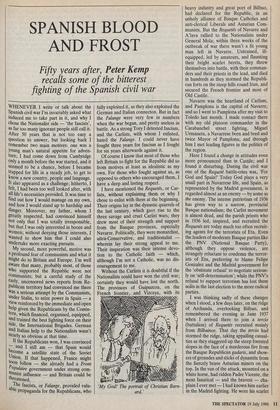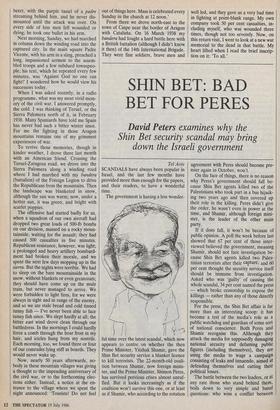SPANISH BLOOD AND FROST
Fifty years after, Peter Kemp
recalls some of the bitterest fighting of the Spanish civil war
WHENEVER I write or talk about the Spanish civil war I'm invariably asked what induced me to take part in it, and why I chose the Nationalist side — 'the fascists', as far too many ignorant people still call it. After 50 years that is not too easy a question to answer, but looking back I remember two main motives: one was a young man's natural appetite for adven- ture;. I had come down from Cambridge only a month before the war started, and it seemed to be a chance, before I became trapped for life in a steady job, to get to know a new country, people and language. It also appeared as a challenge; hitherto, I felt, I had been too well looked after, with all life's necessities provided. It was time to find out how I would manage on my own, and how.' would stand up to hardship and danger. Moreover, my father, whom I greatly respected, had convinced himself not only that I was totally irresponsible, but that I was only interested in booze and Women; without denying those interests, I wanted to show him that I could also undertake more exacting pursuits. My second, more powerful, motive was a profound fear of communism and what it might do to Britain and Europe. I'm well aware that many, probably most, of those who supported the Republic were not communists; but a careful study of the early, uncensored news reports from Re- publican territory had convinced me there was a serious attempt by the Communists, under Stalin, to seize power in Spain — a view reinforced by the immediate and open help given the Republicans by the Comin- rn, which financed, organised, equipped, and trained the best fighting force on their side, the International Brigades. German and Italian help to the Nationalists wasn't nearly so obvious at that time.
If the Republicans won, I was convinced — and I still am — that Spain would become a satellite state of the Soviet Union. If that happened, France might soon follow — she already had a Front Populaire government under strong com- munist influence — and Britain could be threatened. The fascists, or Falange, provided valu- able Propaganda for the Republicans, who fully exploited it, as they also exploited the German and Italian, connecton. But in fact the Falange were very few in numbers when the war began, and pretty useless in battle. As a strong Tory I detested fascism, and the Carlists, with whom I enlisted, hated the Falange. I could never have fought three years for fascism as I fought for six years afterwards against it. Of course I know that most of those who left Britain to fight for the Republic did so from motives at least as idealistic as my own. For those who fought against us, as opposed to others who encouraged them, I have a deep and lasting respect. I have mentioned the Requetes, or Car- lists, without explaining them or why I chose to enlist with them at the beginning. Their origins lay in the dynastic quarrels of the last century, which gave rise to the three savage and cruel Carlist wars; they drew most of their strength and support from the Basque provinces, especially Navarre. Politically, they were monarchist, ultra-Conservative, and traditionalist wherein lay their strong appeal to me. Their inspiration was their intense devo- tion to the Catholic faith — which, although I'm not a Catholic, was no dis- couragement to me. Without the Carlists it is doubtful if the Nationalists could have won the civil war; certainly they would have lost the north. The provinces of Guipuzcoa, on the French frontier, and Vizcaya, with its `My God! The portrait o Christian Barn- heavy industry and great port of Bilbao, had declared for the Republic, in an unholy alliance of Basque Catholics and anti-clerical Liberals and Asturian Com- munists. But the Requetes of Navarre and A'lava rallied to the Nationalists under General Mola; within three weeks of the outbreak of war there wasn't a fit young man left in Navarre. Untrained, ill- equipped, led by amateurs, and flaunting their bright scarlet berets, they threw themselves into battle, with their comman- ders and their priests in the lead, and died in hundreds as they stormed the Republi- can forts on the steep hills round Irun, and secured the French frontier and most of Old Castile.
Navarre was the heartland of Carlism, and Pamplona is the capital of Navarre; and so I went to Pamplona after my visit to Toledo last month. I made contact there with my old platoon commander in the Carabanchel street fighting, Miguel Urmaneta, a Navarrese born and bred and twice Mayor of Pamplona; and through him I met leading figures in the politics of the region.
Here I found a change in attitudes even more pronounced than in Castile; and I found it disturbing. During the civil war one of the Requete battle-cries was, `For God and Spain!' Today God plays a very small part in Navarrese life, and Spain, as represented by the Madrid govenment, is regarded almost as an enemy — by some as the enemy. The intense patriotism of 1936 has given way to a narrow, provincial Basque nationalism; the Carlist movement is almost dead, and the parish priests who in 1936 led, inspired, and recruited the Requetes are today much too often recruit- ing agents for the terrorists of Eta. Even the leaders of moderate Basque parties like the PNV (National Basque Party), although they oppose violence, are strangely reluctant to condemn the terror- ists of Eta, preferring to blame Felipe Gonzalez and the Madrid government for the 'obstinate refusal' to negotiate serious- ly on `self-determination'; while the PNV's refusal to support terrorism has lost them seats in the last election to the more radical parties.
I was thinking sadly of these changes when I stood, a few days later, on the ridge of Archanda, overlooking Bilbao, and remembered the evening in June 1937 when I arrived there to join a tercio (battalion) of Requetes recruited mainly from Bilbainos. That day the tercio had stormed the ridge, taking appalling casual- ties as they staggered up the steep forested slopes in the face of a murderous fire from the Basque Republican gudaris, and show- ers of grenades and sticks of dynamite from the fiercely brave Asturian miners on the top. In the van of the attack, mounted on a white horse, had ridden Padre Vicente, the most fanatical — and the bravest — cha- plain I ever met — I had known him earlier in the Madrid fighting. He wore his scarlet beret, with the purple tassel of a padre streaming behind him, and he never dis- mounted until the attack was over. On every side of him men fell wounded or dying; he took one bullet in his arm.
Next morning, Sunday, we had marched in column down the winding road into the captured city. In the main square Padre Vicente, with his arm in a sling, preached a long, impassioned sermon to the assem- bled troops and a few subdued townspeo- ple; his text, which he repeated every few minutes, was 'Against God no one can fight!' I wondered how he would view his successors today.
When I was asked recently, in a radio programme, what was my most vivid mem- ory of the civil war, I answered promptly, the cold. I was thinking of Teruel, or the Sierra Palomera north of it, in February 1938. Many Spaniards have told me Spain has never had such a bitter winter since. For me the fighting in those Aragon mountains remains one of my grimmest experiences of war.
To revive those memories, though in kinder weather, I drove there last month with an American friend. Crossing the Teruel-Zaragoza road, we drove into the Sierra Palomera along a winding road where I had marched with my bandera (battalion) of the Foreign Legion to drive the Republicans from the mountains. Then the landscape was blanketed in snow, although the sun was warm; now, under a hotter sun, it was green, and bright with scarlet poppies.
The offensive had started badly for us, when a squadron of our own aircraft had dropped two great loads of 500-lb bombs on our division, massed on a rocky moun- tainside, waiting for the assault; they had caused 500 casualties in five minutes. Republican resistance, however, was light; a prolonged and heavy artillery bombard- ment had broken their morale, and we spent the next few days mopping up in the sierra. But the nights were terrible. We had to sleep on the bare mountainside in the snow, without blankets or even greatcoats; they should have come up on the mule train, but never managed to arrive. We were forbidden to light fires, for we were always in sight and in range of the enemy, and so we ate stale bread and cold tinned tunny fish — I've never been able to face tunny fish since. We slept hardly at all; the bitter east wind drove clean through our battledress. In the mornings I could hardly force a comb through the hoar frost in my hair, and icicles hung from my nostrils. Each morning, too, we found three or four of our comrades lying stiff as boards. They would never wake up.
Now, nearly 50 years afterwards, no- body in these mountain villages was giving a thought to the impending anniversary of the civil war, or to the forthcoming elec- tions either. Instead, a notice at the en- trance to the village where we spent the night announced: 'Tourists! Do not feel out of things here. Mass is celebrated every Sunday in the church at 12 noon.'
From there we drove north-east to the town of Caspe near the border of Aragon with Cataluna. On 16 March 1938 my bandera had fought a hard battle here with a British battalion (although I didn't know it then) of the 14th International Brigade. They were fine soldiers, brave men and well led, and they gave us a very bad time in fighting at point-blank range. My own company took 50 per cent casualties, in- cluding myself, who was wounded three times, though not too severely. Now, on this return visit, I went to look at a new war memorial to the dead in that battle. My heart lifted when I read the brief inscrip- tion on it: 'To all.'



















































 Previous page
Previous page